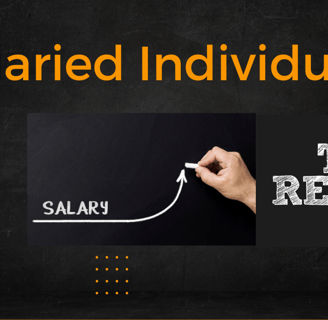We Provide Effortless Tax Filing for Busy Professionals!
Make tax season stress-free and accurate with my Expertise income tax filing services. As, I specialize in tax filing for salaried people and can guide you through the entire process. With my expertise, you can rest easy knowing that your taxes are filed correctly and on time.
Who are Salaried Individuals?
Salaried individuals are employees who receive a fixed and regular compensation, known as a salary, for their work. Their income is typically paid on a monthly basis and is predetermined by an employment contract or agreement between the employee and the employer. Salaried individuals may work full-time or part-time and are often entitled to certain benefits, such as health insurance, retirement plans, and paid time off, as outlined in their employment terms.
In contrast to hourly or wage workers who are paid based on the number of hours worked, salaried individuals receive a consistent amount regardless of the actual hours worked, as long as they fulfill their job responsibilities. Salaried positions often include roles in various industries and professions, ranging from office jobs and managerial positions to skilled trades and technical roles.
What Does Salary Income Include?
In the context of the Income Tax Act of 1961 in India, "salary income" is defined broadly and includes any payment received by an individual from an employer for services rendered. The definition encompasses various components and benefits that form part of an individual's compensation package. Here are the key elements typically considered as salary income under the Income Tax Act:
1. Basic Salary: The fixed component of an employee's salary agreed upon in the employment contract.
2. Allowances: Different types of allowances provided by the employer, such as house rent allowance (HRA), dearness allowance (DA), transport allowance, etc.
3. Bonuses: Any bonus or commission received by an employee can be considered as part of the salary income.
4. Perquisites: Non-monetary benefits or facilities provided by the employer, such as a company-provided accommodation, car, medical facilities, etc.
5. Employer's Contribution to Provident Fund (EPF) and Gratuity: The employer's contribution to EPF and payments related to gratuity are included in the salary income.
6. Profit in Lieu of Salary: Any profit, commission, or fees received in addition to or in lieu of salary is considered part of salary income.
7. Pension: Pension received by an individual, whether periodic or as a lump sum, is treated as salary income.
It's important to note that exemptions and deductions are available under the Income Tax Act, which can reduce the taxable portion of the salary income. For example, HRA exemptions, standard deduction, and deductions under Section 80C for contributions to provident fund, life insurance premiums, etc., can help in reducing the taxable income.
Due Date for Filing Income Tax Returns for Salaried Individuals
For individuals (non-audit cases), the due date for filing income tax returns for the financial year ending on March 31 is typically July 31st of every year.
Keep in mind that there are different due dates for various categories of taxpayers, and they may vary based on whether the taxpayer is eligible for audit, the type of audit, and other factors.
To obtain the current and specific due date information, you can visit the official website of the Income Tax Department of India or refer to the latest finance acts and notifications.
Documents Required For filing Income Tax Return of Salaried Individuals
The documents required for filing income tax returns for a salaried individual includes the following:
1. Form 16: This is a certificate issued by the employer that provides details of the salary income, allowances, and deductions. It is a crucial document for salaried individuals.
2. Salary Slips: Monthly or periodic salary slips that detail the components of your salary, allowances, and deductions.
3. Bank Statements: Statements for all bank accounts held during the financial year can be useful for verifying income, transactions, and interest earned.
4. TDS Certificates: Form 16A for TDS on income other than salary (e.g., interest income, rental income) should be collected from deductors.
5. Investment Proof: Documents supporting investments made under Section 80C (such as Provident Fund contributions, life insurance premium receipts, etc.).
6. Rent Receipts: If you are claiming House Rent Allowance (HRA), you may need rent receipts and a copy of the rent agreement.
7. Interest Certificates: If you have home loans or educational loans, interest certificates from the respective institutions.
8. Form 26AS: This is a statement that shows all taxes paid against your PAN. It can be downloaded from the income tax e-filing portal.
9. PAN (Permanent Account Number): A copy of your PAN card is essential for filing income tax returns.
10. Aadhaar Card: As per the latest regulations, linking Aadhaar with PAN is mandatory, so having your Aadhaar card is important.
11. Details of Other Income: Any income received from other sources, such as rental income, capital gains, or freelance work, should be documented.


Contacts
Socials
Subscribe to our newsletter
+91 9743234568
